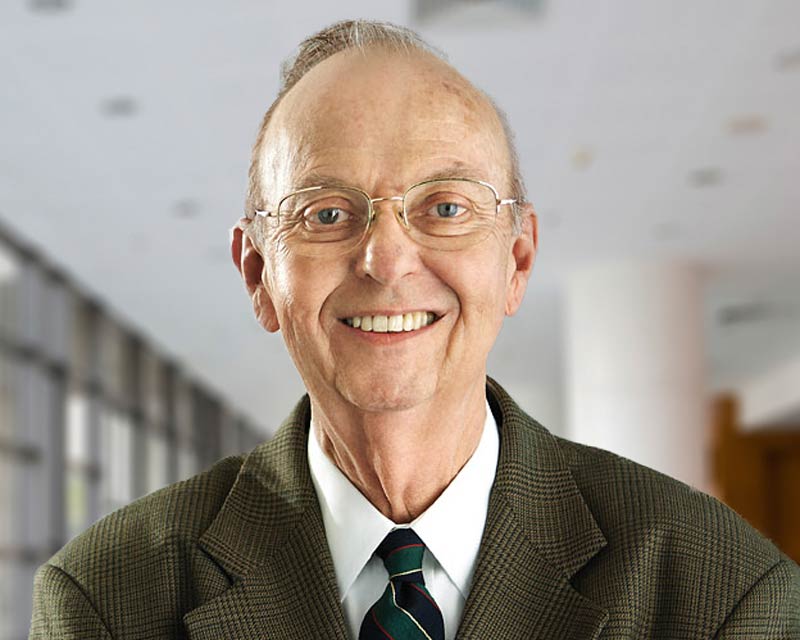
Researchers combine nanobiotechnology, neutrophils and nucleic acid to combat lupus
 Ronald Whisler, MD, began his career in rheumatology and immunology when the disciplines were still in their infancy. One of the early physicians of the medical center’s Division of Rheumatology and Immunology, Dr. Whisler served as its director for nearly 30 years.
Ronald Whisler, MD, began his career in rheumatology and immunology when the disciplines were still in their infancy. One of the early physicians of the medical center’s Division of Rheumatology and Immunology, Dr. Whisler served as its director for nearly 30 years.
This summer, the Ohio Association of Rheumatology recognized Dr. Whisler with its Lifetime Achievement Award. The society’s most prestigious honor, the award recognizes medical professionals who’ve demonstrated outstanding dedication, leadership and achievements in the field.
“This award is quite an honor,” says Dr. Whisler, who joined The Ohio State University Wexner Medical Center in 1977. “I appreciate the recognition.”
Wael Jarjour, MD, director of the Division of Rheumatology and Immunology at Ohio State, says, “Dr. Ron Whisler is a giant among rheumatologists. His contribution to scientific knowledge has been enormous, he has provided outstanding care to many patients in central Ohio and he has taught and influenced innumerable medical students, residents and fellows. The best part for me has been working with him over the last 12 years.”
To recognize his distinguished career, Ohio State’s board of trustees also honored him by establishing the Ronald L. Whisler MD Chair in Rheumatology and Immunology to recognize his career and leadership.
Throughout his medical training, Dr. Whisler watched the fields of rheumatology and immunology shift their focus to treating autoimmune diseases on a molecular and biochemical level. He spent his undergraduate years studying zoology and chemistry, but knew he had found the perfect fit in the fields of rheumatology and immunology. Earning his medical degree from and spending most of his career at The Ohio State University, he had also found his perfect place.
Throughout his career as a clinician and researcher, Dr. Whisler has helped elevate the field’s level of sophistication.
“Fundamentally, what’s changed in rheumatology is that we’re treating inflammatory arthritis earlier with definitive therapy,” he says. “When I was in training, the prevailing thought — which I never agreed with — was to give patients aspirin, recommend bed rest, put them in physical therapy and wait to see what happened.”
The field has progressed due to research, which Dr. Whisler considers his greatest career achievement. He and the division faculty have attracted a constant flow of federal funding to the department. He adds that by pushing the boundaries through research, he and his fellow physicians could improve patient treatment in real time. “I’m proud that I could add to the knowledge base and help lay the groundwork for new generations of researchers to discover new drugs and diagnostics. As a result, we have a much wider range of medications available and can tailor treatment to a patient’s specific needs,” he says.
Named Professor Emeritus in 2009, Dr. Whisler looks back on his 40-year teaching career with fondness.
“It’s gratifying to see a resident or fellow come in knowing very little about rheumatology, and after a couple of years watch them manage cases quite comfortably and competently with the skills they have acquired,” he says.
He learned how to mentor young doctors at Mayo Clinic, where he worked as a fellow and researcher for three years under some of the country’s best specialists before coming to the Ohio State Wexner Medical Center.
Dr. Whisler grew up on a dairy farm in Laurelville, Ohio, a small town located 40 miles southeast of Columbus. Looking back on his upbringing, he realizes that the farm provided good training for his career in medicine.
“On a farm, you work six to seven days a week,” he says. “Farm life is like medicine in terms of hours and intensity.”
Dr. Whisler also credits the U.S. Navy Medical Corp when he was with the Marines as serving as a training ground for his successful career.
Aside from a few years at Mayo Clinic and the University of Minnesota, Dr. Whisler spent the majority of his career at the Ohio State Wexner Medical Center. He built great friendships and a close team of colleagues who collaborated across departments. “I like Ohio State because there’s a lot of talent available,” he says. “If you have a problem or need help with a specific area, you’re bound to find an expert.”